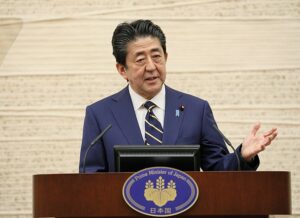
After the bait-and-switch bombing of Japan, the appalled leader of the Manhattan Project, J. Robert Oppenheimer, embarks on a public crusade for a future free of nuclear holocaust, thinking that great minds will save the people.

After the bait-and-switch bombing of Japan, the appalled leader of the Manhattan Project, J. Robert Oppenheimer, embarks on a public crusade for a future free of nuclear holocaust, thinking that great minds will save the people.

Donald C. Wood assesses the failed record of economic policies pursued by Shinzo Abe, right-wing former Prime Minister of Japan.
The use of nuclear weapons can only lead to mass destruction and inhumane and catastrophic consequences, as the bombings of Hiroshima and Nagasaki have shown.

Japan’s 5.26 trillion-yen fiscal 2019 defense budget set a new record for the fifth straight year, as the country continued to beef up its armed forces while keeping a wary eye fixed on North Korea and China. The . . .
Teresa Wright, Popular Protest in China, Polity Press, Cambridge, UK, 2018
and
Jessica Chen Weiss, Powerful Patriots: Nationalist Protest in China’s Foreign Relations, Oxford University Press, 2014.
Teresa Wright’s concise but comprehensive overview, Popular Protest in China, has only become more relevant in the . . .

In 2019, the World Bank (WB) and the IMF will be 75 years old. These two international financial institutions (IFI), founded in 1944, are dominated by the USA and a few allied major powers who work to generalize policies that . . .
New Politics readers will be interested in reading Mina Hamilton’s sharp analysis of Japan’s nuclear crisis in her recent article on Dissident Voice. Since the article was published on March 16, Mina has added the following note: